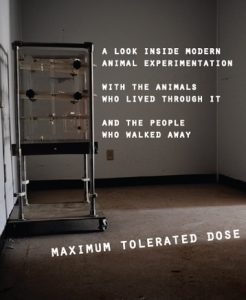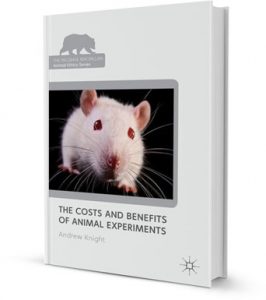Maximum Tolerated Dose
Maximum Tolerated Dose is the first feature-length documentary by Decipher Films. Equal parts found-footage mash-up, verite investigation, and artful meditation, the film charts the lives of both humans and non-humans who have experienced animal testing first-hand. In February 2013, HRA hosted a visit by director Karol Orzechowski and screenings of the movie in Melbourne, Sydney, Canberra and Brisbane. The screenings were attended by HRA supporters, members of the public and people from within the animal research industry. Director Karol Orzechowski was also interviewed on Weekend Sunrise.
The costs and benefits of animal experiments.
Also in February, HRA, together with Anti Vivisection Union of South Australia, proudly sponsored an Australian speaking tour by Dr Andrew Knight.
Dr Knight toured six Australian capitals speaking on humane teaching methods in biomedical education, and the themes of his recent book on animal experiments and alternatives. He gave a total of 12 presentations in Brisbane, Adelaide, Melbourne, Perth, Sydney and Hobart, including presentations at the University of Queensland, School of Veterinary Science at Gatton, Murdoch University in Perth, the University of Sydney, and the University of Tasmania, with additional, less formal presentations at public dinners in most cities.
Public Opinion Poll
Our Public Opinion Poll, conducted by Nexus Research, was a follow up from our previous poll in 2008. It didn’t reveal any groundbreaking shift in attitudes, but it did show that we are slowly progressing.
What did the poll reveal?
- 64% of respondents do not believe that humans have the moral right to experiment on animals. This is up from 58% in 2008. (6% shift)
- 50% believe that animal experiments are necessary for the development of human medicines. This is down from 59% in 2008. (9% shift)
- More than half the population (56%) don’t believe that it is always safe to transfer results from animal research to apply to humans. This compares with 53% in 2008. (3% shift)
- 63% say they would not donate to a health or medical research charity if they knew it were funding animal experiments. In comparison, 57% said no in 2008. (6% shift)
- 68% support the use of scientific alternatives to the killing of animals in research. Although there is very little awareness of the alternatives. 84% did know of any.
Not a huge paradigm shift, small but positive progress, however, when we consider 6% of the Australian population, that’s equates to 460,000 people who have swayed their views to opposing animal experiments.
Case studies:
Researching and publishing case studies is a major part of our work. We obtain research papers from medical journals, cut through the scientific jargon and translate them into layman’s terms. We do this to demonstrate that the experiments that occur behind lab doors are not some exaggerated claims from yesteryear. They are happening right here and now.
This year we have uncovered:


